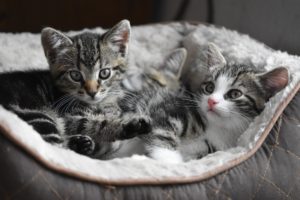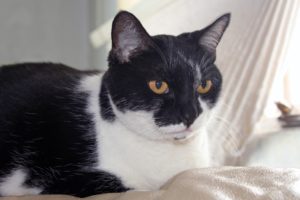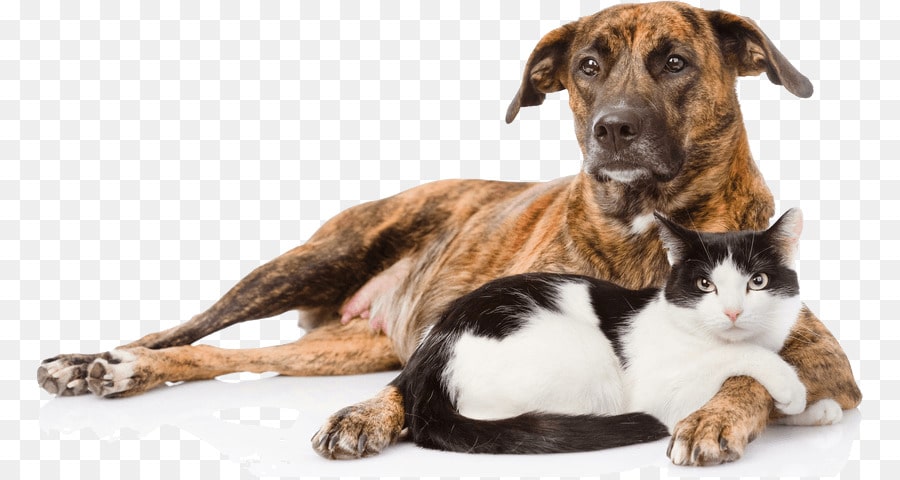Cats are obligatory carnivores. As such, their digestive health needs are different from dogs, which are omnivores. Cats are also susceptible when it comes to the taste and smell of food.
Immunity of kittens
A healthy pregnant cat passes her maternal antibodies to her kittens, giving her newborns passive immunity before and shortly after birth.[1] The mother produces colostrum or first milk that’s rich in maternal antibodies. These antibodies protect the kittens against diseases to which the mother is immune.
Note that the maternal antibodies are passed in the mother’s milk only during the first three days of delivery. It is essential to check if the kittens are nursing during this period. If not, you might want to seek a veterinarian’s help.
Your kittens’ digestive health

At around 3 1/2 to 4 1/2 weeks of age, kittens should have started eating solid food. “[Start offering] milk replacer in a shallow bowl, then introduce a moist and chewable diet. You can make gruel from warmed milk replacer and a high-quality dry or canned kitten food. Serve it in a shallow bowl and feed the kittens several times each day. By five weeks old, they should be getting used to their new diet. By six to seven weeks old, they should be able to chew dry food, and you’ll no longer need to moisten it. Kittens are typically fully weaned by around eight weeks of age.”[2]
Make sure that your food for kittens contains at least 30% protein. That’s because they need large amounts of energy—about two to three times that of an adult cat. Kittens from six to 12 weeks old should be fed four times a day. Kittens from three to six months old should be fed three times a day. Kittens are prone to digestive problems so watch out for any signs of sensitivities connected to the food you’re giving them.
Diet for adult cats
Because cats are obligatory carnivores, cats have certain nutritional requirements that can come from eating animal protein. Specific and essential amino acids, fatty acids, and vitamins must come from animal sources. You can find these in high-quality cat foods from Addiction foods. These provide the essential nutrients adult cats need.
Our cat food formulas can target a cat’s specific nutritional needs. Please consult your veterinarian to understand which of our pet foods best meets your cat’s dietary needs. But in general, cat food with probiotics can improve the digestion of your feline pets. According to PetMD.com, “The strains that cats tend to do best with are those of the Bifidobacterium and Enterococcus families. Bifidobacterium tends to live in the small intestine, whereas Enterococcus generally resides in the colon (large intestine)… Bifidobacterium is more involved with digestion and the Enterococcus aids with the formation of normal feces and helping to maintain colonic health.”[3]
High-quality sources
Meat protein from high-quality sources also aids in keeping your cat’s digestive system healthy. Novel meats like venison, salmon, or duck help prevent your cat’s sensitive tummy from getting worse. When looking for high-quality proteins and other essential ingredients choose a pet food like Addiction, made in one of the world’s cleanest and purest places to manufacture pet food—New Zealand.
Senior years

Cats are considered seniors when they reach 11 years old, and super seniors once they reach 15 years and above.[4] Due to their age, elderly cats begin to lose the ability to digest fat and protein. Their hearing fades, their immune function weakens, their skin becomes less elastic, and they also develop a low tolerance for stress.
Along with these signs of aging, their appetite also wanes. That’s because a cat’s sense of taste and smell also diminishes. You might have to recalibrate how often you feed your senior cat: four to six small meals spread throughout the day. Always consult your veterinarian before doing so.
Senior cats are also prone to dehydration, especially if they have chronic kidney disease. Make sure that clean water is available for them at all times.
Digestive problems of senior cats
Constipation. Many senior cats fail to drink some water, leading to dehydration and constipation. Ensure that your cat has access to clean water at all times. Constipation can also be caused by slow metabolism in senior cats. Another reason might be arthritis or anal-gland problems, which can cause painful defecation. So your cat may avoid eliminating as long as possible to avoid the pain.[5] If constipation lasts for more than a day, contact your veterinarian immediately.
Diarrhea. Diarrhea comes and goes quickly in cats. For senior cats, this might be a symptom of another disease. If it lasts more than a day or two, seek a veterinarian’s help. If the poop is black or bloody, call your vet right away.
Weight loss. While older cats exhibit weight loss, this might be caused by hyperthyroidism or organ failure. These diseases have something to do with the metabolic changes your senior cat is going through. To ensure that your senior cat does not have kidney problems or hyperthyroidism, take your cat in a regular check-up with your vet twice a year.
Digestive care for senior cats
Senior cats have a tendency to become picky with their food because of their reduced ability to smell and taste the food. Also, senior cats “do not digest as much energy per meal as an adult cat…it is important to feed senior cats smaller, more frequent meals of a highly digestible diet throughout the day.”[6] Carefully select the best cat food formula that takes into consideration the nutritional needs of a senior feline.
A good senior diet for cats
The People’s Dispensary for Sick Animals (PDSA) in the UK has this to say about a senior cat’s diet:
“Now that your cat is getting older, their diet will need changing to meet their more mature needs. You might notice their activity levels start to slow down. It has been found that although a geriatric cat’s energy requirements don’t reduce by much, their body can find it more difficult to break down protein and fat quite so easily. Also, some older cats can struggle with dental problems, with loss of teeth or sore mouth due to dental disease, amongst others. With all of this in mind, changing your cat to a life stage appropriate diet can support your cat’s older body, making it easier for them to digest food and stay as healthy as possible.”
Consider the following for your senior cat’s diet:
- More high-quality animal protein
- Omega fatty acids
- Dehydrated or freeze-dried balanced diet formula reconstituted with water
- Whole, raw, unprocessed, organic, non-GMO ingredients
Vitamin supplements
In an experiment done on nutritional supplements, adding extra vitamin E, beta-carotene, omega-3, and -6 fatty acids, and a prebiotic in the diets of middle-aged to older cats seems to have a positive effect.[7] You might want to look for the following in the list of ingredients of your cat food: vitamin E, vitamin A, carrots (a natural source of beta-carotene), flaxseed or fish oil (to supply omega-3 fatty acids), animal-based sources of protein like eggs and chicken for omega-6 fatty acids, and a prebiotic like chicory root or beet pulp.
If you choose to give your feline friend other food or vitamin supplements, consult your vet. Different senior cats have different nutritional needs.
Addiction Foods believes that understanding how your cat’s dietary needs and health are the first steps to giving your pet a long and healthy life. Check out our Nutrition Advisor in our home page to discover the right pet food for your pet.
We have gone further by producing and distributing pet food for cats and dogs under strict safety measures. Your favorite pet food brands will still be available at your local store. Stay safe and shop responsibly or avail of contactless online delivery.
Like us on Facebook and follow us on Instagram for more pet health and nutrition updates.
References:
- https://vcahospitals.com/know-your-pet/kitten-raising-kittens
- https://pets.webmd.com/cats/guide/newborn-kitten-care#1
- https://www.petmd.com/cat/general-health/probiotics-cats-what-are-they-and-how-do-they-help
- https://icatcare.org/advice/elderly-cats-special-considerations/#:~:text=In%20recent%20years%2C%20feline%20ages,their%20age%20in%20human%20terms.
- https://www.petassure.com/new-newsletters/changes-youll-see-in-your-aging-cat/
- https://journals.sagepub.com/doi/10.1016/j.jfms.2009.07.011
- https://www.petmd.com/blogs/nutritionnuggets/cat/jcoates/2012/oct/dietary_supplements_to_consider_for_older_cats-27601
For further reading:
- https://www.rspcapetinsurance.org.au/pet-care/cat-care/what-should-feed-cat#:~:text=They%20must%20have%20meat%20to,acceptable%20food%20for%20daily%20feeding.
- https://www.kirkwoodvets.com/cats/feeding-adult-cats/
- https://myanimals.com/animals/domestic-animals-animals/cats/all-about-the-feline-digestive-system/
- https://missinglinkproducts.com/2017/03/24/cats-digestive-health/
- https://en.engormix.com/pets/articles/the-difference-between-dog-t33740.htm
- https://www.vetfolio.com/learn/article/weight-loss-in-senior-cats
- https://vetmed.illinois.edu/weight-loss-in-older-cats/#:~:text=Weight%20loss%20in%20older%20cats%20is%20often%20readily%20attributed%20to,pancreatic%20insufficiency%2C%20and%20dental%20problems.
- https://pets.webmd.com/cats/guide/feeding-your-senior-cat#1
- https://en.wikipedia.org/wiki/Senior_cat_diet
- https://www.petmd.com/blogs/nutritionnuggets/cat/jcoates/2012/oct/dietary_supplements_to_consider_for_older_cats-27601











